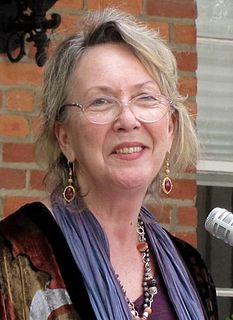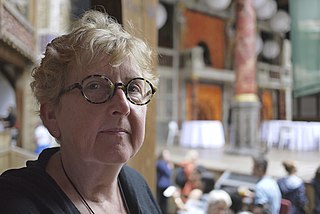A Quote by Kathryn Stripling Byer
The poems in Katherine Soniat's new collection, The Swing Girl, weave emotion's 'spray going farther than thought' with the 'bedrock things' of the trod-upon world. These poems eddy and pool in unpredictable and often surprising ways, much as the mind moves in its twilight state between waking and sleep. The fluidity of their cadence and the luminosity of their imagery carry the reader to the wellspring of poetry itself, that deep delight of which Robert Penn Warren spoke, whose source is, in Soniat's words, 'beauty on its way to being mystery.'
Quote Topics
Beauty
Bedrock
Being
Between
Cadence
Carry
Collection
Deep
Delight
Emotion
Farther
Fluidity
Girl
Going
Imagery
Itself
Mind
Moves
Much
Mystery
New
Often
Poems
Poetry
Pool
Reader
Robert
Sleep
Source
Spoke
Spray
State
Surprising
Swing
Than
Things
Thought
Twilight
Unpredictable
Waking
Warren
Way
Ways
Weave
Wellspring
Which
Whose
Words
World
Related Quotes
The judges who awarded the 1980 Commonwealth Poetry Prize to my first collection of poems, Crossing the Peninsula and Other Poems, cited with approval and with no apparent conscious irony my early poem, "No Alarms." The poem was composed probably sometime in 1974 or 1975, and it complained about the impossibility of writing poetry - of being a poet - under the conditions in which I was living then.
There are definitely connections between poems, but I wanted each to stand on its own. I guess it goes back to the idea of trying to zoom in and out, and to modulate, so there are different ways of looking at any experience for the reader. Even having short poems and long poems - there has to be some kind of variation in the experience of reading as a whole.
I believe it's impossible to write good poetry without reading. Reading poetry goes straight to my psyche and makes me want to write. I meet the muse in the poems of others and invite her to my poems. I see over and over again, in different ways, what is possible, how the perimeters of poetry are expanding and making way for new forms.
These are crystalline - oftentimes incandescent - translations of Juarroz's powerful metaphysical poems where eternity and silence jut up against a world where “writing infects the landscape” and there are “more letters than leaves” - The kind of match one hopes for where both the translator and the poet are in luck; new poems which don't leak and yet old poems in which the original passion shines.
Writing fiction, for me, is a more indirect form of self-exploration than writing verse. When I'm working on a novel I'm moving characters around and I'm thinking about plot and there's a lot of other things going on at the level of structure and story. With a poem, a single idea or line or emotion can sometimes be enough - there's often a sense, in the best poems, of capturing a single instant. Perhaps poems differ from prose in the degree of solace they can offer - by speaking so personally, so directly, about shared experience. A few lines of poetry can provide comfort.







































